 |
Changchun New Industries Optoelectronics Technology Co., Ltd.
Lasers,
Optics & Photonics |
|
The Research by Laser Tools |
Nowadays, laser technology is
practically ubiquitous, and lasers
are a tool used in
developing
innovations. Up to now, more than
ten thousand of academic papers have
been published by using CNI lasers,
and the optical beam can be found in
various practial applications.
To memorize the event, we
listed some applications in respect
to our customers. |
| |
|
01 Confocal Light Field Microscopy |
|
The institute of Neuroscience,
Chinese Academy of Sciences,
presents a new imaging method,
confocal light field microscopy, to
enable fast volumetric imaging deep
into brain. They demonstrated the
power of this method by recording
whole brain calcium transients in
freely swimming larval zebrafish and
observed behaviorally correlated
activities on single neurons during
its prey capture. Furthermore, they
captured neural activities and
circulating blood cells over a
volume ⌀ 800 μm x 150 μm at 70 Hz
and up to 600 μm deep in the mice
brain. |
|
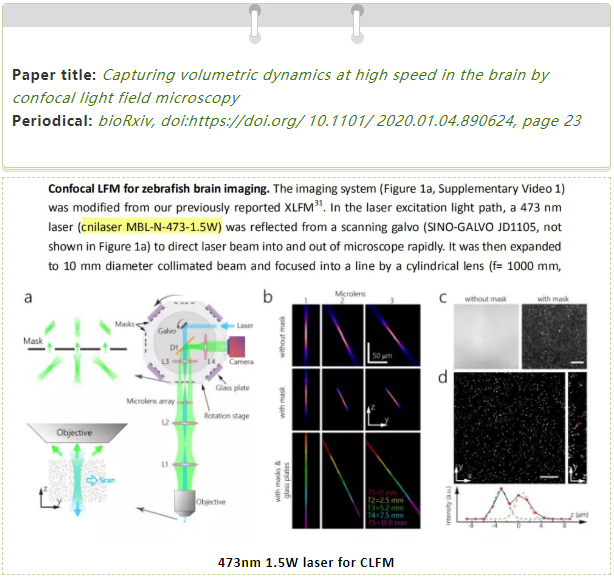
|
|
02 Handheld Photoacoustic Imaging |
With the aim of clinical
translation, a photoacoustic imaging
platform with a portable system
size, a miniaturized imaging probe,
and convenient handheld capability
is demand.
Nanyang Technological University had
an experiment by adopting an
ultrathin central-holed matrix array
and a compact coaxial photoacoustic
design, a water-free handheld
photoacoustic imager is developed
(weight: 44 g). This experiment
uses a 15mJ fiber coupled laser that
customized
by
CNI, and its paper is
published in IEEE
Transactions on Biomedical
Engineering. |
|
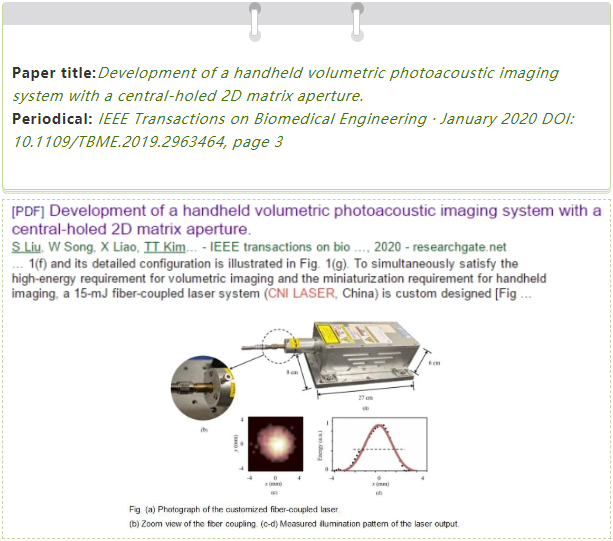
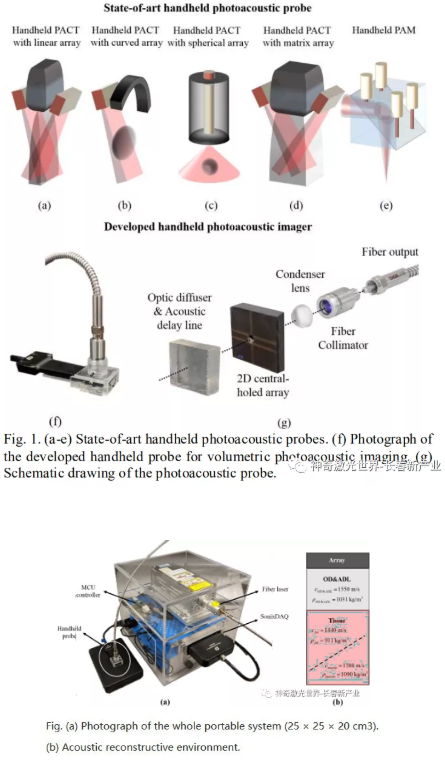
|
|
03 Photodynamic Therapy |
Antimicrobial photodynamic therapy
(aPDT) leads to the generation of
reactive oxygen species (ROS) that
destroys bacterial cells in presence
of a photosensitizer, visible light,
and oxygen.
Aligarh Muslim University has
taken Enterococcus Faecalis and
Streptococcus mutans as monospecies
culture and their dualspecies
culture biofilm. Antibacterial
effect was evaluated by colony
forming unit while antibiofilm
action by crystal violet and
congored binding assays. Finally
they found that reactive oxygen
species and singlet oxygen yield was
found to be light dose dependent and
antimicrobial photodynamic
efficiency is directly related to
the ROS production. They use a
630nm CNI laser to
complete the experiment and
published their paper in
Photodiagnosis and Photodynamic
Therapy, 2019 - Elsevier. |
|
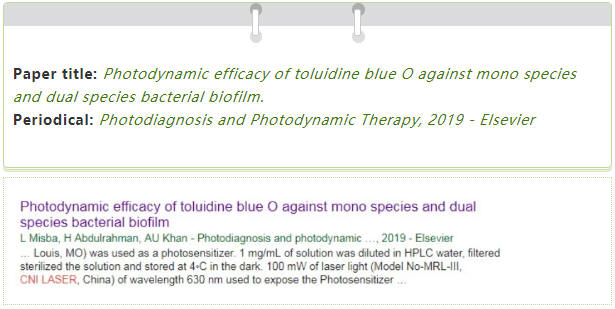
|
|
04 Nitrogen-vacancy Center Detection |
Electron spin resonance (ESR)
spectroscopy has broad applications
in physics, chemistry, and biology.
However, the traditional
zero-fifield ESR (ZF-ESR) method has
been rarely used due to the low
sensitivity and the requirement of
much larger samples than
conventional ESR.
The University of Science and
Technology of China presents a
method for deploying ZF-ESR
spectroscopy at the nanoscale by
using a highly sensitive quantum
sensor, the nitrogen vacancy center
in diamond. This method opens the
door to practical applications of
ZF-ESR spectroscopy, such as
investigation of the structure and
polarity information in
spin-modifified organic and
biological systems. They use a
CNI 532nm laser and their paper
is published in Nature
Communications. |
|
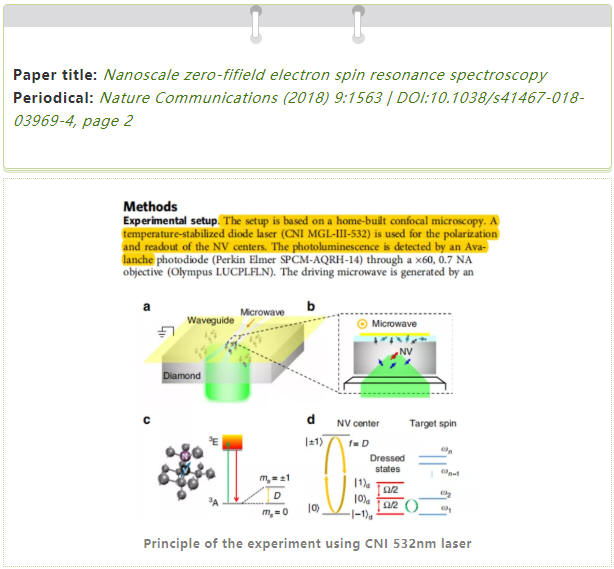
|
|
05 Synthetic Biology |
Droplet microfluidics enables
massively-parallel analysis of
single cells, biomolecules, and
chemicals, making it valuable for
high-throughput screens. However,
many hydrophobic analytes are
soluble in carrier oils, preventing
their quantitative analysis with the
method.
Synthetic biologists engineer
organisms to produce high-value
compounds, including drugs,
biofuels, and chemical building
blocks. The University of
California applys Printed
Droplet Microfluidics to construct
defined reactions with chemicals and
cells incubated under air on an open
array. The method interfaces with
most bioanalytical tools and
retainshy drophobic compounds in
compartmentalized reactors, allowing
their quantitation. This experiment
uses a multi-line laser that contain
405nm, 473nm, 532nm and 640nm
that manufacutured by CNI Laser.
Their paper is published in
Scientific Reports. |
|

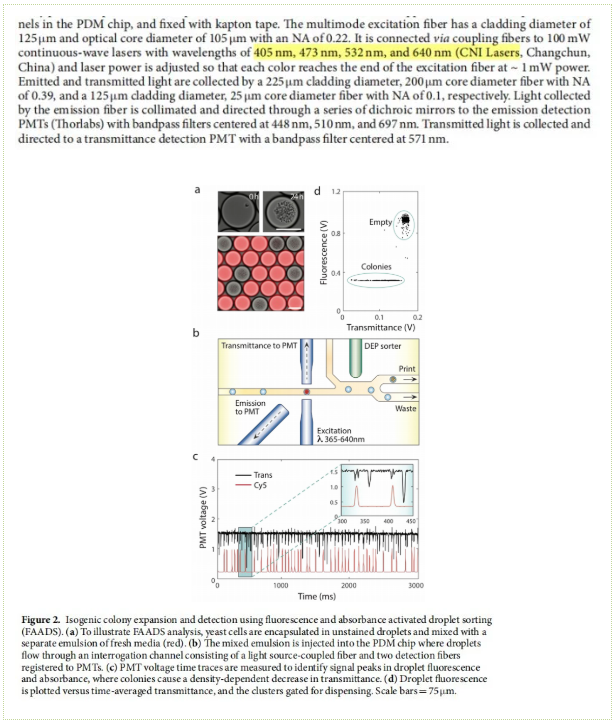
|
|
06 Optical Diffraction Tomography |
|
Korea Advanced Institute of
Science and Technology presents
a multimodal approach for measuring
the three-dimensional (3D)
refractive index (RI) and
fluorescence distributions of live
cells by combining optical
diffraction tomography (ODT) and 3D
structured illumination microscopy
(SIM). A digital micromirror device
is utilized to generate structured
illumination patterns for both ODT
and SIM, which enables fast and
stable measurements. They use CNI
473nm and 532nm single frequency
lasers to complete the
experiment, and the paper of this
research is published in
Scientific Reports. |
|
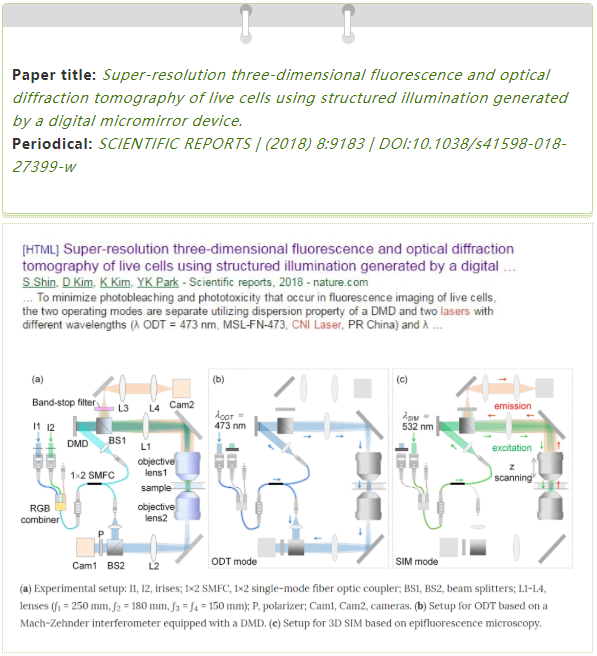
|
|
07 Optoelectronic Synaptic |
In recent years, optoelectronic
synaptic devices have become the
application platform for next
generation neuromorphic system and
artificial neural network.
The key synaptic functions such as
excitatory postsynaptic current
(EPSC) and paired-pulse-facilitation
(PPF) were successfully emulated by
Human Key Laboratory of Super
Microstructure and Ultrafast
Process, School of Physics and
Electronics, Central South
University.
More importantly, by exposing an
ultraviolet (360nm) laser (CNI
Laser), the transformation of
short-term memory (STM) to long-term
memory (LTM) can be mimicked in our
neuromorphic devices. These results
represent an important step toward
the next-generation neural networks
enabled by photo-electric hybrid
nano-electronics, and point to the
potential of more sophisticated
neuromorphic computations. Their
paper is published in Solid-State
Electronics, 2020 - Elsevier. |
|
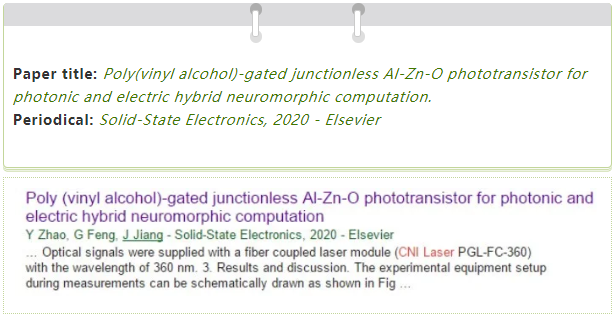 |
|
We feel very happy and honored that
CNI lasers are helping more and more
customers to successfully complete
their research. All CNI staff will
be dedicated to continually evolving
our knowledge and experience to
deliver innovative products and
expertise that advance our
customers. |
|
|
Date: 2020/5/15 |
|
|
|
|